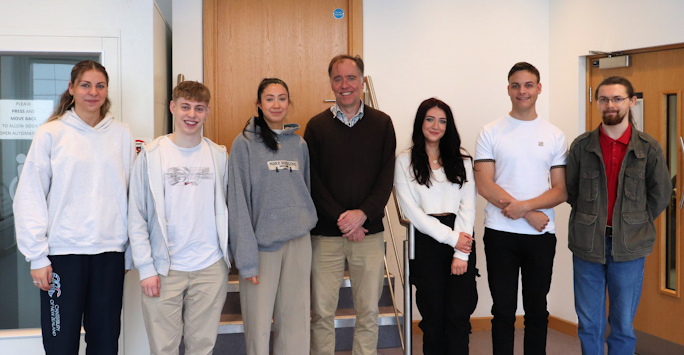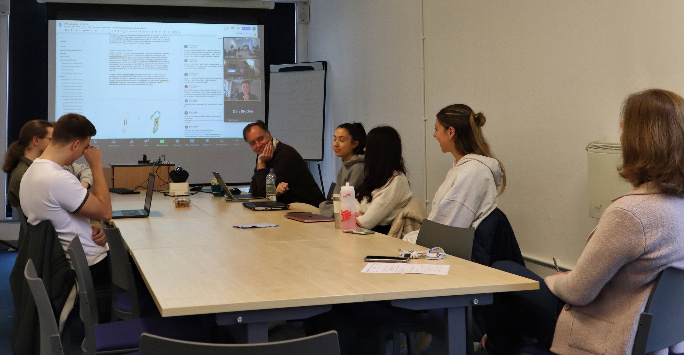
With winter coming to an end and student placements rapidly approaching, we look back to last year, when six undergraduate students joined Professor Dan Rigden’s group for a Summer Research Studentship.
Dan Rigden is a Professor of Protein Bioinformatics and his interests span the broad relationships between protein sequences, structures and functions and how these evolve with time. His group is based in the Biosciences Building and their research focusses on the application of a range of bioinformatics tools to diverse proteins of interest.
Six second year undergraduate students - Abbie Connor, Amy Duggan, Fred McDermott, Joshua Hale, Luke Norris and Sophie Whinney – spent six to ten weeks with Professor Rigden’s group. They worked together on using AlphaFold to model mysterious pandoravirus proteins to see what can be predicted about their function. Pandoraviruses are amazing and poorly understood, almost as physically large as a typical bacterium and with genomes as large (1000 genes). For some proteins they looked at specific functions that could be predicted, for others not, and there were a surprising number of novel folds – protein structures that were not like anything previously seen - in the results.
At the end of summer, the students all decided to carry on, tidy up some loose ends and try to collectively write the work up for publication. The results of the summer research aligned with results from that of a former MRes student, Joe Horder, who is now carrying out a PhD at Nottingham and together they are now well on their way to putting together a publication based on their research.
Professor Rigden commented: "When offering a student project the main aim is to provide training in research but I’ve been surprised by how valuable the results have been. The students are a great resource who are capable of carrying out important work that supports our existing research activities."

Why did you choose to do this studentship?
Joshua: I have a passion to work in research, and to study a PhD with a strong computational element. This studentship gave me an exciting opportunity to work in the fascinating field of protein bioinformatics and helped me start developing key skills and experience for making a PhD application.
Abbie: I chose to do this studentship as I enjoyed the e-biology module and wanted to expand my skillsets within this field as well as gain a deeper understanding of bioinformatics, which I thought would not only be interesting but would also allow me to gain knowledge useful for future career opportunities when applying for jobs and provide me with skills that are becoming ever more useful as big data is being utilised more widely and increasing in importance.
Luke: I had developed a passion for bioinformatics from experience in taught modules such as e-biology and wanted to develop my understanding of the intricacies and techniques behind analysing biological molecules. The opportunity would provide me with hands on skills not able to gained through taught modules, and a student summer scheme would convey to employers that I am eager for chances to put myself forward to learn new skills.
What are some of the transferable skills that you have learnt?
Joshua: Alongside a lot of technical computational skills, I was really able to develop problem solving and critical thinking skills when deciding upon the best methods to use and evaluating their results. I also developed spoken and written communication skills when discussing results and asking questions, and contributing to a draft manuscript for publication.
Abbie: I have improved my writing skills in writing up my results for the pre-print of the paper. I have also improved my organisation skills as I had to organise my work so that it was understandable by others, as well as saving files in places where they would be easily findable later. I also improved my problem-solving skills in that I investigated my assigned clades independently and investigated functionality.
Luke: Time management skills gained through following a protocol to analyse proteins individually and working on a pre-print paper. Organisation skills through learning the best ways to store files and record notes in ongoing logbook. Problem solving skills through learning new bioinformatics software and developing my own methods for analysis.
Was it different to how you expected?
Joshua: There was more time spent working independently, which produced a more flexible pacing of work than I had expected.
Abbie: I didn’t expect to be part of a team writing a paper to be published. I also didn’t expect to gain experience with such a vast array of different softwares and become confident in using them independently.
Luke: I did not expect the plethora of different analysis software available, and this really highlighted exactly how intricate bioinformatic analysis could be. I also did not expect to carry on the work following summer, but I am glad I had the opportunity to continue the work and even gain experience in writing a pre-print.
Did it influence your career aspirations at all?
Joshua: Yes; it reinforced my aspiration to enter a career in research, and to use the bioinformatics skills I learnt as part of that.
Abbie: Yes, it demonstrated that I could utilise software and allowed me to realise that I would be able to go into a career that involves data analysis and bioinformatics.
Luke: Yes, it allowed me to determine which areas of bioinformatics most interested me, and this has informed by career aspects towards these particular sectors.
Would you recommend the studentship to other students? If so, why?
Joshua: Yes, it was a great hands-on research experience. In contrast to an Honours Project, the studentship allows one to focus purely on the scientific question at hand, and on carrying out research-work, which I really enjoyed.
Abbie: Yes, I would recommend the studentship to other students. I think that the experience gained is extremely beneficial, it will also be a good opportunity to apply and build upon previously learned skills.
Luke: Yes, any students interested in developing their bioinformatics skills, even if they’re not confident in their abilities, should consider taking this opportunity to find out what they’re capable of and develop their understanding.
Any advice for future students?
Joshua: For any student interested or unsure about a career in research, or doing a PhD, the studentship is a great opportunity to explore this.
Abbie: Ensure to manage your time well and guarantee that work is always organised so that it is easily understandable when you review work afterwards.
Luke: This scheme required good organisation skills and a base level understanding of Bioinformatics and computer filing systems.